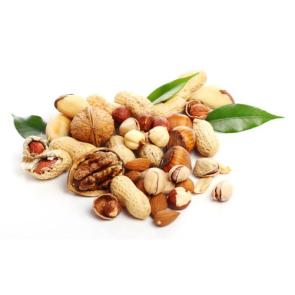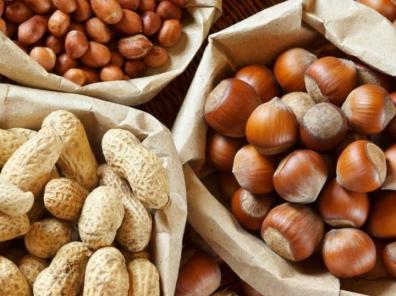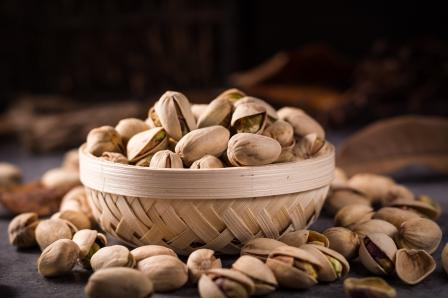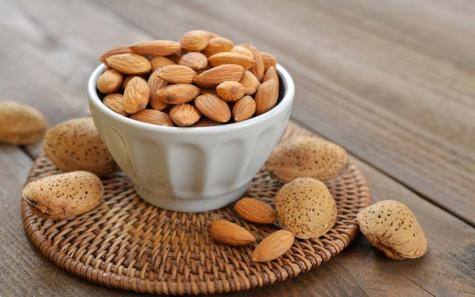Pregnancy is a time of profound transformation and growth, not only for the expectant mother but also for the developing baby. Eating a well-balanced diet rich in essential nutrients is crucial to support the health and well-being of both the mother and the growing fetus. Fresh almonds, with their abundance of vitamins, minerals, and antioxidants, offer a myriad of benefits during pregnancy. In this comprehensive guide, we will delve into the nutritional profile of fresh almonds and explore the ways in which they can support a healthy pregnancy.

.
 **Nutritional Profile of Fresh Almonds** Fresh almonds are a nutritional powerhouse, packed with a wide array of essential nutrients that are beneficial for pregnant women. These nutrient-dense nuts are a rich source of protein, healthy fats, fiber, vitamins, and minerals. A one-ounce serving of almonds (approximately 23 nuts) contains 6 grams of protein, 14 grams of healthy fats, 3.5 grams of fiber, and a variety of essential vitamins and minerals, including vitamin E, magnesium, calcium, and iron. One of the key nutrients found in almonds is folic acid, also known as folate, which plays a crucial role in preventing neural tube defects and promoting healthy brain development in the fetus. Adequate intake of folic acid during pregnancy is essential for reducing the risk of birth defects, such as spina bifida and anencephaly. Fresh almonds are a natural source of folic acid, making them an excellent addition to a pregnant woman’s diet. In addition to folic acid, almonds are also rich in vitamin E, an antioxidant that helps protect cells from damage and supports healthy skin, hair, and nails. Vitamin E is particularly important during pregnancy, as it helps boost the immune system and promotes overall well-being for both the mother and the baby. Furthermore, almonds contain minerals such as magnesium, calcium, and iron, which are essential for bone health, muscle function, and red blood cell production. **Health Benefits of Fresh Almonds During Pregnancy** Including fresh almonds in your pregnancy diet can offer a wide range of health benefits for both you and your baby. Some of the key benefits of consuming almonds during pregnancy include: 1. **Supports Fetal Development**: The nutrients found in fresh almonds, such as folic acid, vitamin E, and minerals, play a crucial role in supporting the healthy development of the fetus. Folic acid helps prevent birth defects, while vitamin E supports cellular growth and development.
**Nutritional Profile of Fresh Almonds** Fresh almonds are a nutritional powerhouse, packed with a wide array of essential nutrients that are beneficial for pregnant women. These nutrient-dense nuts are a rich source of protein, healthy fats, fiber, vitamins, and minerals. A one-ounce serving of almonds (approximately 23 nuts) contains 6 grams of protein, 14 grams of healthy fats, 3.5 grams of fiber, and a variety of essential vitamins and minerals, including vitamin E, magnesium, calcium, and iron. One of the key nutrients found in almonds is folic acid, also known as folate, which plays a crucial role in preventing neural tube defects and promoting healthy brain development in the fetus. Adequate intake of folic acid during pregnancy is essential for reducing the risk of birth defects, such as spina bifida and anencephaly. Fresh almonds are a natural source of folic acid, making them an excellent addition to a pregnant woman’s diet. In addition to folic acid, almonds are also rich in vitamin E, an antioxidant that helps protect cells from damage and supports healthy skin, hair, and nails. Vitamin E is particularly important during pregnancy, as it helps boost the immune system and promotes overall well-being for both the mother and the baby. Furthermore, almonds contain minerals such as magnesium, calcium, and iron, which are essential for bone health, muscle function, and red blood cell production. **Health Benefits of Fresh Almonds During Pregnancy** Including fresh almonds in your pregnancy diet can offer a wide range of health benefits for both you and your baby. Some of the key benefits of consuming almonds during pregnancy include: 1. **Supports Fetal Development**: The nutrients found in fresh almonds, such as folic acid, vitamin E, and minerals, play a crucial role in supporting the healthy development of the fetus. Folic acid helps prevent birth defects, while vitamin E supports cellular growth and development.
..
 2. **Boosts Energy Levels**: Pregnancy can be physically demanding, and many expectant mothers experience fatigue and low energy levels. Almonds are a nutrient-dense snack that can provide a natural energy boost to help you stay active and alert throughout the day. 3. **Aids Digestion**: The fiber content in almonds can help prevent constipation, a common issue during pregnancy due to hormonal changes and pressure on the digestive system. Including almonds in your diet can promote healthy digestion and reduce digestive discomfort. 4. **Regulates Blood Sugar Levels**: Almonds have a low glycemic index, which means they help regulate blood sugar levels and prevent spikes and crashes. This is particularly important for pregnant women, as fluctuating blood sugar levels can impact energy levels and overall health. 5. **Supports Heart Health**: Almonds are a heart-healthy food rich in monounsaturated fats, which can help lower cholesterol levels and reduce the risk of heart disease. Including almonds in your pregnancy diet can support cardiovascular health for both you and your baby. 6. **Reduces Inflammation**: The antioxidants found in almonds, such as vitamin E and flavonoids, help reduce inflammation in the body and support the immune system. By including almonds in your diet, you can help protect against inflammation-related conditions and support overall health. **How to Incorporate Fresh Almonds Into Your Pregnancy Diet** There are countless ways to enjoy fresh almonds as part of your pregnancy diet. Here are some simple and delicious ideas to incorporate almonds into your meals and snacks: 1. **Snack on Almonds**: Enjoy a handful of almonds as a nutritious and satisfying snack between meals. Mix them with dried fruits or dark chocolate for a tasty and energizing treat. 2. **Add Almonds to Yogurt**: Sprinkle sliced almonds over a bowl of yogurt for added crunch and protein. Top with honey or fresh berries for a delicious and nutritious breakfast or snack.
2. **Boosts Energy Levels**: Pregnancy can be physically demanding, and many expectant mothers experience fatigue and low energy levels. Almonds are a nutrient-dense snack that can provide a natural energy boost to help you stay active and alert throughout the day. 3. **Aids Digestion**: The fiber content in almonds can help prevent constipation, a common issue during pregnancy due to hormonal changes and pressure on the digestive system. Including almonds in your diet can promote healthy digestion and reduce digestive discomfort. 4. **Regulates Blood Sugar Levels**: Almonds have a low glycemic index, which means they help regulate blood sugar levels and prevent spikes and crashes. This is particularly important for pregnant women, as fluctuating blood sugar levels can impact energy levels and overall health. 5. **Supports Heart Health**: Almonds are a heart-healthy food rich in monounsaturated fats, which can help lower cholesterol levels and reduce the risk of heart disease. Including almonds in your pregnancy diet can support cardiovascular health for both you and your baby. 6. **Reduces Inflammation**: The antioxidants found in almonds, such as vitamin E and flavonoids, help reduce inflammation in the body and support the immune system. By including almonds in your diet, you can help protect against inflammation-related conditions and support overall health. **How to Incorporate Fresh Almonds Into Your Pregnancy Diet** There are countless ways to enjoy fresh almonds as part of your pregnancy diet. Here are some simple and delicious ideas to incorporate almonds into your meals and snacks: 1. **Snack on Almonds**: Enjoy a handful of almonds as a nutritious and satisfying snack between meals. Mix them with dried fruits or dark chocolate for a tasty and energizing treat. 2. **Add Almonds to Yogurt**: Sprinkle sliced almonds over a bowl of yogurt for added crunch and protein. Top with honey or fresh berries for a delicious and nutritious breakfast or snack.
…
3. **Include Almonds in Salads**: Toss chopped almonds into your salads for an extra boost of texture and flavor. Almonds pair well with leafy greens, fruits, and vinaigrette dressings for a healthy and refreshing meal. 4. **Make Almond Butter**: Blend roasted almonds in a food processor to make creamy almond butter. Spread it on whole grain toast, apple slices, or crackers for a nutritious and satisfying snack. 5. **Bake with Almond Flour**: Substitute almond flour for traditional flour in baked goods to add a nutty flavor and boost the nutritional value of your treats. Almond flour is gluten-free and rich in protein, making it a healthy alternative for pregnant women. 6. **Drink Almond Milk**: Enjoy a glass of almond milk as a refreshing and dairy-free alternative to cow’s milk. Almond milk is rich in calcium and vitamin D, which are essential for bone health during pregnancy. **Precautions When Consuming Almonds During Pregnancy** While almonds are generally safe to consume during pregnancy, it’s important to take certain precautions to ensure their safety and maximize their benefits: 1. **Allergies**: Some individuals may have allergies to tree nuts, including almonds. If you have a history of nut allergies or allergic reactions, consult with your healthcare provider before including almonds in your diet during pregnancy. 2. **Portion Control**: Almonds are calorie-dense nuts, so it’s important to practice portion control to avoid excessive caloric intake. Stick to recommended serving sizes and avoid consuming large quantities of almonds in one sitting. 3. **Raw vs. Roasted**: While raw almonds are a nutritious option, roasted almonds may contain added salt, oils, or flavorings that can be less healthy. Opt for raw or dry-roasted almonds to minimize added ingredients and maximize nutritional benefits. 4. **Storage**: Store almonds in a cool, dry place away from sunlight to maintain their freshness and prevent rancidity. Consider refrigerating or freezing almonds to extend their shelf life and preserve their quality.




Your comment submitted.